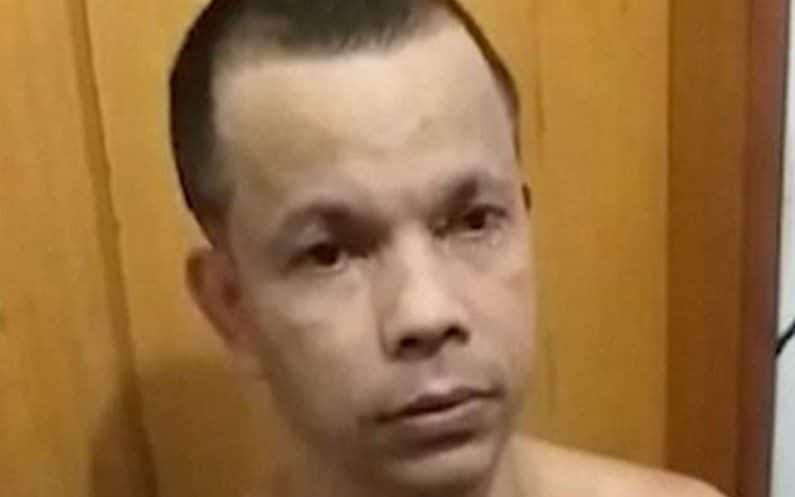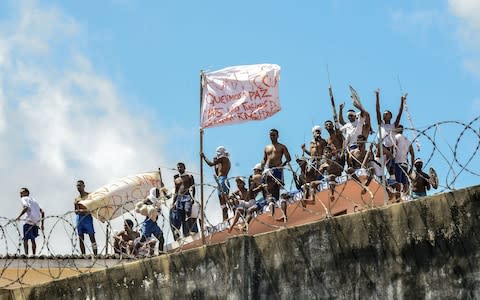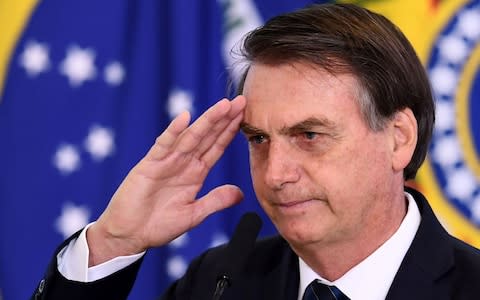Brazilian drug dealer who tried to escape jail dressed as daughter found dead in cell
A Brazilian drug dealer who tried to escape prison dressed as his daughter has been found dead in his cell.
Clauvino da Silva, a 42-year-old leader of one of the most powerful criminal groups in Brazil, Comando Vermelho, was stopped by guards at the prison in Rio de Janeiro on Saturday.
He was dressed in a silicon mask, a long-haired dark wig, tight jeans and a pink t-shirt – trying to pass off as his 19-year-old daughter, who had come to visit him.

She had planned to stay behind while he made his getaway.
Guards were alerted after they noticed someone looking suspicious. Video footage of da Silva removing his disguise went viral.
It was the second time da Silva had tried to flee; in 2013 he successfully went on the run, tunneling out with 27 other prisoners and going on the run for a month, before he was re-captured in an operation to clear a Rio favela.

On Tuesday prison authorities announced that the trafficker, who had been sentenced to 73 years behind bars, had been found hanged in his cell.
"The inmate appears to have hanged himself with a bed sheet," Rio's prison authority said in a statement, adding that an investigation had been opened.
Experts estimate hundreds of prisoners are killed in Brazilian prisons every year, mostly in confrontations between rival gangs battling for control of one of the world's most important cocaine markets and trafficking routes.
Brazil has the world's third-largest prison population after the United States and China, with more than 800,000 inmates.
Last week, at least 57 people died after a prison riot broke out in the northern state of Para. More than 50 inmates died in similar circumstances in May during prison riots in the northern state of Amazonas.

Prison gangs, originally formed to protect inmates and advocate for better conditions, have come to wield vast power that reaches far beyond prison walls.
On Monday Jair Bolsonaro, Brazil’s president, sparked anger after saying that criminals were “going to die in the streets like cockroaches” if he succeeded in passing a measure aimed at blocking the prosecution of police officers and civilians who kill suspects.
He argued Brazilian police were fighting an “unequal” battle against crime and should be decorated for using their guns, not taken to court.
Last year Brazilian police killed almost 6,200 people, an increase of nearly 1,000 over the previous year. In Rio the rate so far this year is the equivalent to one person killed by police every five hours.
Mr Bolsonaro, a Right-wing former soldier elected on a promise to end corruption and reduce crime, said “that’s how it should be,” asserting that his proposal would both provide police with “legal cover” to fight crime. He said the move would protect “upstanding citizens” looking to defend themselves.

Known as the Trump of the Tropics, Mr Bolsonaro’s campaign was heavy on tough rhetoric against criminals.
“You cannot treat (criminals) as if they were normal human beings, ok?” he said, during last year’s campaign.
“If he kills 10, 15 or 20 with 10 or 30 bullets each, he needs to get a medal and not be prosecuted.”
That hardline message has broad appeal in a country where, according to the independent Brazilian Public Security Forum, 63,880 people were killed in 2017.
The day before, Mr Bolsonaro responded to the twin mass-shootings in America by arguing that his signature policy of relaxing gun control measures was the answer.
“These are abhorrent comments,” said Ariel de Castro Alves, a veteran human rights activist and lawyer in Sao Paulo.
“We’ve had 414 killings committed by military police in Sao Paulo in the first half of 2019 – that is the highest number since 2003,” he said. “He is encouraging police violence and ends up serving as a kind of instigator of brutality.”

